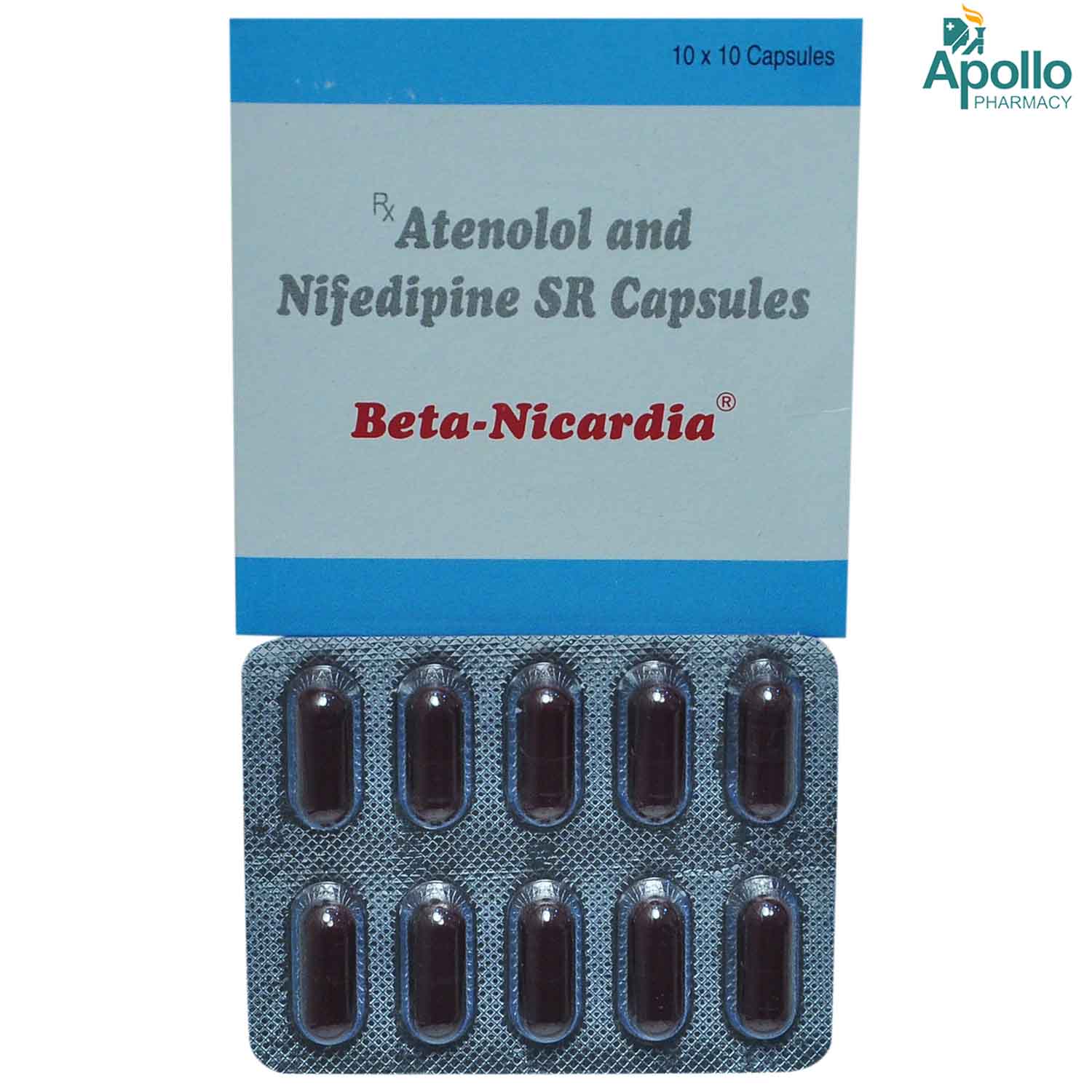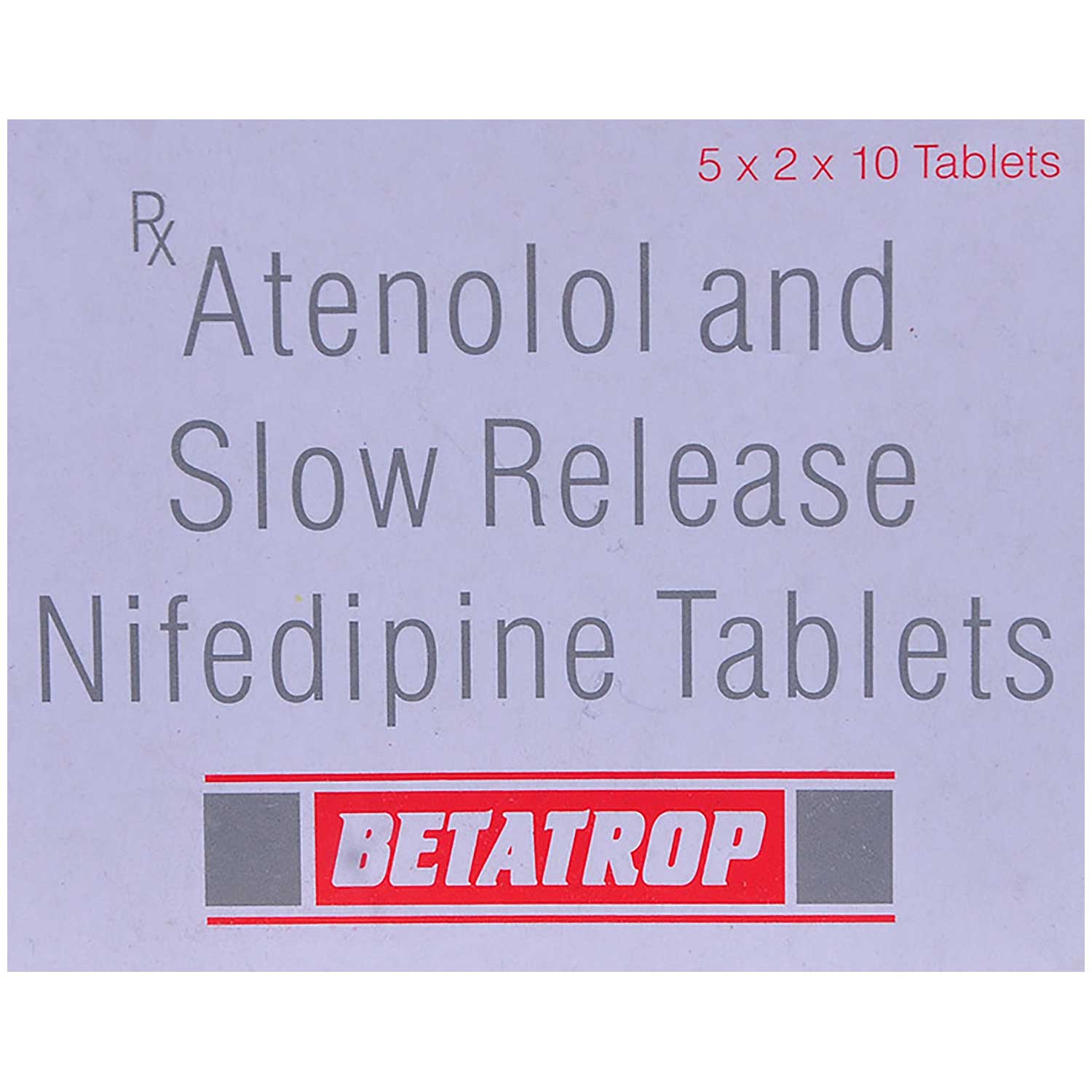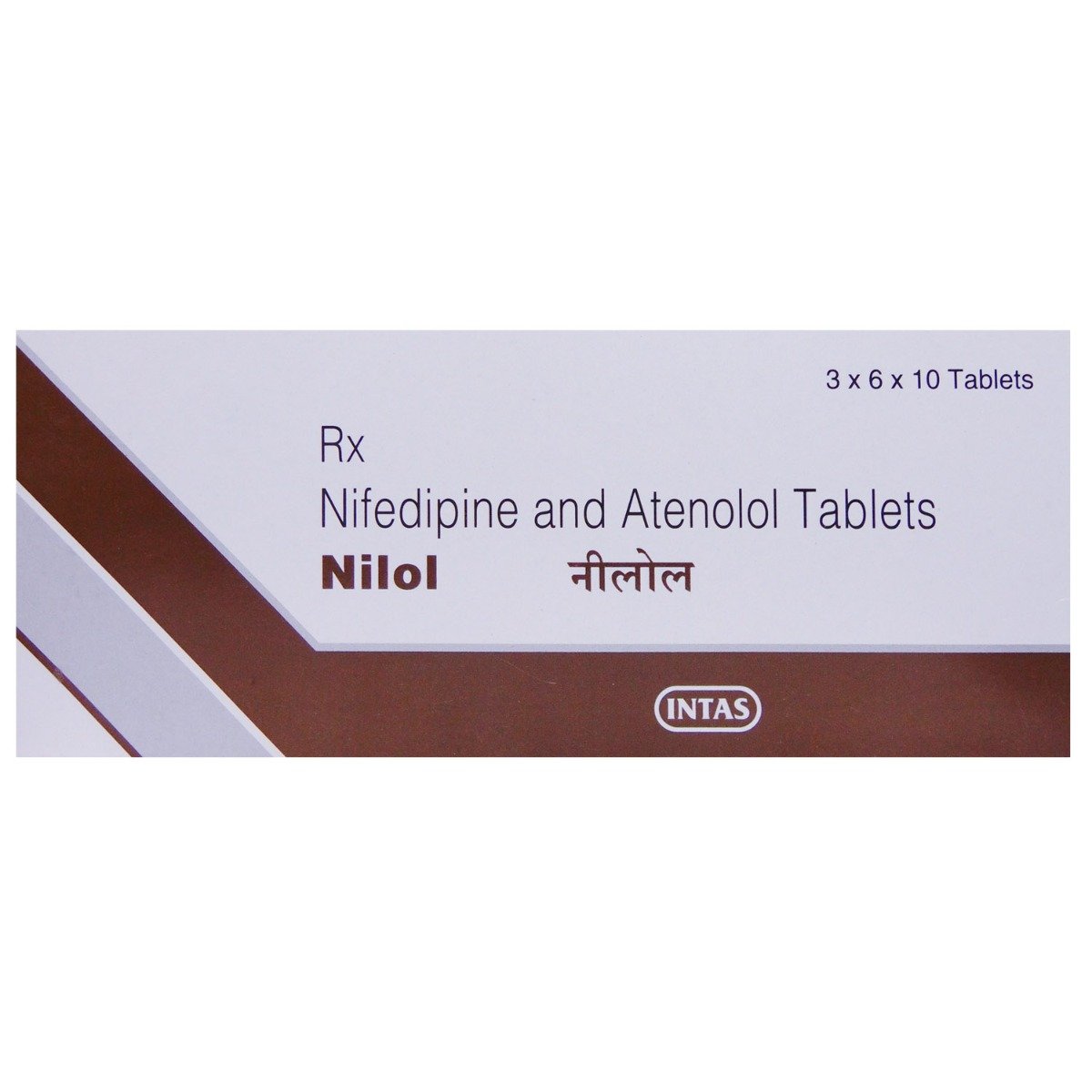Atenolol+nifedipine
About Atenolol+nifedipine
Atenolol+nifedipine belongs to the class of combination medication called 'anti-hypertensive drugs,' primarily used to treat hypertension (high blood pressure). Hypertension is a medical condition in which the blood exerts high pressure (force exerted by circulating blood) against blood vessels' walls. This condition makes the heart work harder in pumping blood to the whole body. Hypertension can cause severe health complications, including stroke, heart failure, heart attack, and kidney failure.
Atenolol+nifedipine contains Atenolol (beta-blocker) and Nifedipine (calcium channel blocker). Atenolol works by reducing the heart rate and makes the heart pump blood efficiently throughout the body. Nifedipine works by relaxing the blood vessels; this lowers your blood pressure and reduces your risk of having a stroke, a heart attack, other heart problems, or kidney problems in the future. This medicine needs to be taken regularly to be effective and also for the best results.
Take Atenolol+nifedipine as prescribed by your doctor. You are advised to take Atenolol+nifedipine for as long as your doctor has prescribed it for you, depending upon your medical condition. In some cases, you may experience blurred vision, sweating, tiredness, dehydration, constipation, dizziness, headache, nausea, cold hands or feet, and muscle cramps. Most of these side effects of Atenolol+nifedipine do not require medical attention and gradually resolve over time. However, if the side effects are persistent, reach out to your doctor.
Do not stop taking Atenolol+nifedipine without consulting your doctor since it may worsen your condition and increase the risk of future heart problems. Inform your doctor if you are suffering from kidney, liver, heart diseases, diabetes, gout, and asthma. Please tell your doctor if you are taking any other medicines or have any allergic reactions to Atenolol+nifedipine. Reducing the amount of table salt (sodium chloride) in your food often relieves the body's swelling. Do not eat grapefruit or drink grapefruit juice while you're taking Atenolol+nifedipine. It can make side effects worse. If you are pregnant or breastfeeding, please tell your doctor so that the dosage of Atenolol+nifedipine can be prescribed accordingly.
Uses of Atenolol+nifedipine
Medicinal Benefits
Atenolol+nifedipine treats hypertension (high blood pressure), consisting of Atenolol (beta-blocker) and Nifedipine (calcium channel blocker). Atenolol works by blocking the release of stress hormones (like adrenaline or non-adrenaline), thereby relieving angina (chest pain) and uneven heartbeats (arrhythmias). Atenolol also protects the heart during the treatment of a heart attack. Nifedipine works by relaxing the blood vessels; this lowers your blood pressure and reduces your risk of having a stroke, a heart attack, other heart problems, or kidney problems in the future. This medicine needs to be taken regularly to be effective and also for the best results. Thus, Atenolol+nifedipine reduces raised blood pressure by minimizing fluid overload (oedema) and reducing the heart's blood-pumping activity.
Directions for Use
Storage
Side Effects of Atenolol+nifedipine
- Blurred Vision
- Sweating
- Tiredness
- Dehydration
- Constipation
- Dizziness
- Headache
- Nausea
- Cold hands or feet
- Muscle cramps
- Difficulty breathing
- Tightness in the chest
Drug Warnings
Do not use Atenolol+nifedipine if you are allergic to Atenolol+nifedipine or any of its components. Let your doctor know if you have any history of severe kidney or liver diseases, low potassium levels (hypokalaemia), chest pain (angina), poor blood circulation or controlled heart failure, first-degree heart block, diabetes, thyrotoxicosis (a condition caused by an overactive thyroid gland), liver problems, and adrenal gland diseases. Let your doctor know if you have anuria (kidneys aren't producing urine), fluid or electrolyte imbalance, lupus erythematosus (an autoimmune inflammatory disease-causing scaly red patches on the skin), gout, abnormal heart rhythms, thyroid disorders, and asthma before starting Atenolol+nifedipine. It is essential to let your doctor know if you are a breastfeeding mother before using Atenolol+nifedipine since Indapamide may pass into the breast milk. Please ask your doctor if you plan to conceive or are pregnant before using Atenolol+nifedipine. Atenolol+nifedipine can increase the chances of light-headedness so rise slowly if you are sitting/lying and avoid operating any machine or doing any work that needs mental alertness. Atenolol+nifedipine is not recommended in people less than 18 years of age.
Drug Interactions
Drug-Drug Interaction: Atenolol+nifedipine is known to interact when taken with an anticancer drug (quinidine), antiepileptic medicine (phenytoin), anti TB drug (rifampicin), antibiotics (erythromycin), other blood pressure-lowering pills (chlorthalidone, ramipril, metoprolol, lisinopril, amlodipine, candesartan, baclofen, levodopa, clonidine) and anti-psychotic drugs (alprazolam, risperidone, amisulpride, pimozide), anti-HIV drug (nelfinavir, ritonavir, saquinavir or amprenavir), drugs used to treat insomnia or anxiety (Phenobarbital).
Drug-Food Interaction: Please keep your doctor informed of what herbal products you are taking, especially St. John's wort (used in the treatment of depression). Also, alcohol consumption, along with Atenolol+nifedipine, is known to cause a blood pressure drop.
Drug-Disease Interaction: Atenolol+nifedipine is contraindicated in patients with severe aortic stenosis (narrowed heart valve), cardiogenic shock (when suddenly heart does not get enough blood supply), a recent history of unstable angina (chest pain), heart failure and hypotension (low blood pressure).
Drug-Drug Interactions Checker List:
Safety Advice

Alcohol
unsafeAlcohol may lower your blood pressure. It would help if you avoided or limit consuming alcohol whilst taking this medicine.

Pregnancy
unsafeAtenolol+nifedipine contains atenolol, a category D pregnancy drug, and it may cause fetal defects in the baby.

Breast Feeding
unsafeDo not take Atenolol+nifedipine as it may pass through the breast milk.

Driving
unsafeAtenolol+nifedipine may cause side effects such as dizziness, drowsiness, which could affect your ability to drive.

Liver
cautionLet your doctor know if you have any history of liver diseases before using Atenolol+nifedipine.

Kidney
cautionLet your doctor know if you have any history of kidney diseases before using Atenolol+nifedipine.

Children
cautionAtenolol+nifedipine is not recommended for use in people below 18 years of age.
Habit Forming
Diet & Lifestyle Advise
- Keep your weight under control with a body mass index (BMI) between 19.5 and 24.9.
- Do regular physical activity or exercise for at least 150 minutes per week, or about 30 minutes most days of the week. Doing this can help you to lower your raised blood pressure by about 5 mm of Hg.
- Limit sodium chloride intake (table salt) in your daily diet to 2300 mg per day or less than 1500 mg is ideal for most adults.
- If you are taking alcohol, use only one serving for women and two servings for men.
- Quit smoking to lower the risk of heart diseases.
- Avoid chronic stress as it can raise your blood pressure. Try to enjoy and spent time with your loved ones to cope with stress.
- Monitor your blood pressure daily, and if you notice any fluctuations frequently, please contact your doctor immediately.
- Try including heart-healthy omega 3 fatty acid-containing foods in your daily diet. You can also use low-fat cooking oils like olive oil, soybean oil, canola oil, and coconut oil that help in lowering your elevated blood pressure.
Special Advise
- Monitor your blood pressure regularly and seek medical advice if you notice any drastic fluctuations.
- Let your anesthetist or medical staff know that you are taking Atenolol+nifedipine since Atenolol can lower blood pressure levels when certain anesthetic medications are given during any operation or surgery.
Patients Concern
Disease/Condition Glossary
Hypertension: It is a chronic condition when blood pressure is too high. Blood pressure is defined as the amount of blood pumped by the heart and the amount of resistance exerted by the arteries against the blood flow. If the heart pumps more blood, then arteries become narrower, and in turn, blood pressure becomes high. If blood pressure becomes uncontrolled, it may lead to serious heart diseases, including stroke and heart attack. Additionally, high blood pressure can also cause brain damage (stroke) and kidney failure. Blood pressure is expressed as systolic and diastolic pressures. Systolic blood pressure represents the contraction and relaxation of the heart. Diastolic pressure is exerted in the blood vessels when the heart beats and is in the resting state. Ideal blood pressure should be between 90/60mmHg and 120/80mmHg. Hypertension is detected when systolic blood pressure is more than 140mmHg, and diastolic pressure is higher than 90mmHg. Some of the symptoms of hypertension include headache, nose bleed, vomiting, and chest pain.
FAQs
Atenolol+nifedipine consists of Atenolol and Nifedipine medicines. Atenolol is a 'beta-blocker and treats high blood pressure, angina (chest pain), and uneven heartbeats (arrhythmias) by reducing the heart rate and making the heart pump blood throughout the body. Nifedipine works by relaxing the blood vessels; this lowers your blood pressure and reduces your risk of having a stroke, a heart attack, other heart problems, or kidney problems in the future.
It is advised to consult your doctor before taking Atenolol+nifedipine if you have a history of severe kidney or liver diseases, low potassium levels (hypokalaemia), diabetes, gout, abnormal heart rhythms, thyroid disorders and asthma.
Yes, Atenolol+nifedipine contains nifedipine, which can cause a sudden drop in blood pressure, especially when you start taking Atenolol+nifedipine, to avoid a sudden drop, please get up gently when sitting down to avoid dizziness.
Even though your blood pressure becomes normal after using Atenolol+nifedipine, it may switch back to high ranges if you stop using it. Your doctor may change the dosing schedule based on your blood pressure range.
If you forget to take Atenolol+nifedipine at any time, take it as soon as you remember, then continue to take it at the usual times. Do not take a double dose to make up for a forgotten dose.








